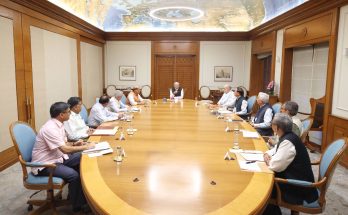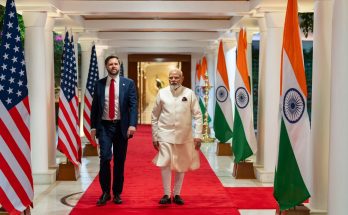
By Shweta Aggarwal
Ending years of hesitations, India and the 27-nation European Union have decided to set up a regular high-level dialogue at ministerial level to explore revival of negotiations for a trade deal and strengthened their strategic partnership through launch of a maritime dialogue.
The first virtual summit between the leaders of India and the EU on July 15 culminated in a 2025 Roadmap for accelerating relations across the spectrum and reaffirmed commitment to effective multilateralism and a rules-based multilateral order.
During the wide-ranging talks, the Indian side was represented by Prime Minister Narendra Modi while the EU was represented by Mr. Charles Michel, President of the European Council, and Ms. Ursula von der Leyen, President of the European Commission.
In a significant step to revive talks on a free trade agreement that have been suspended since 2013, the two sides announced a “high level dialogue” between Commerce Minister Piyush Goyal and E.U. Trade Commissioner Phil Hogan to try and take the Bilateral Trade and Investment Agreement (BTIA) forward.
“India and the E.U. are natural partners. Our partnership is important for global peace and stability, and this reality is clearer given the situation around the world,” said PM Modi. In his remarks, he focused on shared “universal values” of democracy, pluralism, inclusivity, respect for international institutions and multilateralism between India and the E.U.
The two sides agreed to bolster cooperation in the international fora to reinforce international security, enhance global economic stability and inclusive growth, implement the Sustainable Development Goals, protect climate and environment and strengthen preparedness and response for global health emergencies. In this context representatives from the EU expressed that they were optimistic about India’s G20 Presidency in 2022 and its membership in the UN Security Council in 2021-2022.
The summit adopted the “India-EU Strategic Partnership: A Roadmap to 2025” as a guide to cooperation over the next five years, as a recognition of the “unions of diversity” and “common interest in each other’s security, prosperity and sustainable development.” The roadmap included goals and strategies on expanding cooperation in areas of foreign policy, trade and investment, climate change and clean energy, information and communication technology, outer space and global governance.
The two sides also adopted a “Joint Declaration on Resource Efficiency and Circular Economy” and welcomed the upcoming renewal of the India-EU Science and Technology Agreement for another five years.
Issues related to security and counter-terror cooperation figured prominently in the discussions. “Pakistan came up in the context of activities it has been continuing against India and other countries in the region as well as in the context of global terrorism,” Vikas Swarup, Secretary (West) in India’s Ministry of External Affairs, told journalists after the summit.
The joint statement issued after the summit reaffirmed strong commitment of India and the EU to global peace and security, disarmament and non-proliferation and to combat terrorism in all its forms and manifestations, including its financing and countering radicalization.
“India and the EU will intensify exchanges and cooperation in this regard,” it said.
The two sides agreed to fast-track negotiations on a working arrangement between the Central Bureau of Investigations and Europol to support law enforcement authorities of India and the Member States of the EU in preventing and combating organised crime and terrorism.
“They confirmed their full support to an open, free, stable and secure cyberspace, and their commitment to foster the responsible and liable behaviour of all the actors in the cyberspace. They underlined the need to increase global cyber resilience, including the health sector,” the statement said.
Highlights from the India-EU joint statement on July 15, 2020
- Acknowledging the need for global cooperation and solidarity to fight the ongoing pandemic, the leaders agreed to intensify cooperation on health security and pandemic crisis preparedness and response.
- To aid post COVID 19 economic recovery and to support sustainable growth and jobs, both sides agreed to establish a regular high-level dialogue at ministerial level and provide guidance to the bilateral trade and investment relations and to address multilateral issues of mutual interest.
- Discussions on climate change and environmental degradation figured prominently and both sides agreed to work closely in developing an ambitious post 2020 global framework to protect biodiversity through high level dialogue, to be adopted at the 2021 UN Biodiversity Conference.
- Both sides agreed to jointly tackle water issues, air pollution, plastic and marine litter and overall enhance partnership in support of sustainable modernisation. They agreed to upgrade their dialogue and cooperation on technology and engage on 5G and artificial intelligence.
- In tune with their commitment to global peace and security and acknowledging the need to preserve safety and stability of the Indian Ocean, the leaders agreed to launch a dialogue on maritime security and consultations on security and defence to enhance naval cooperation.
(Rushali Saha contributed inputs for this article)
Author Profile
- India Writes Network (www.indiawrites.org) is an emerging think tank and a media-publishing company focused on international affairs & the India Story. Centre for Global India Insights is the research arm of India Writes Network. To subscribe to India and the World, write to editor@indiawrites.org. A venture of TGII Media Private Limited, a leading media, publishing and consultancy company, IWN has carved a niche for balanced and exhaustive reporting and analysis of international affairs. Eminent personalities, politicians, diplomats, authors, strategy gurus and news-makers have contributed to India Writes Network, as also “India and the World,” a magazine focused on global affairs.
Latest entries
 India and the WorldApril 23, 2025Kashmir terror: India hits back at Pakistan, highlights cross-border linkages
India and the WorldApril 23, 2025Kashmir terror: India hits back at Pakistan, highlights cross-border linkages India and the WorldApril 23, 2025The Century of America and India: Growing Together
India and the WorldApril 23, 2025The Century of America and India: Growing Together In ConversationApril 20, 2025India Can Contribute Largely to Development of Morocco’s Defence Industry: Ambassador
In ConversationApril 20, 2025India Can Contribute Largely to Development of Morocco’s Defence Industry: Ambassador India and the WorldApril 2, 2025Mapping Next Steps for BIMSTEC
India and the WorldApril 2, 2025Mapping Next Steps for BIMSTEC







